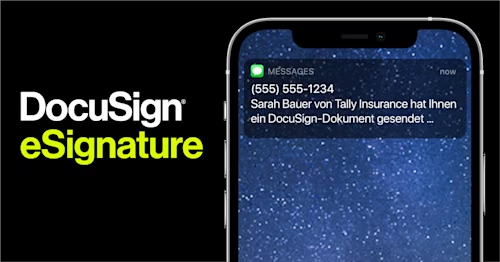
Neu bei eSignature: SMS-Benachrichtigungen
Mit der neuesten Funktion SMS-Benachrichtigungen von Docusign schneller ans vertragliche Ziel. Unterzeichner praktisch und schnell mit SMS benachrichtigen.


In den letzten zehn Jahren hat sich das Verhalten von Verbrauchern ohne Zweifel stark verändert. Immer mehr Menschen wechseln zu Mobilgeräten, um auf wichtige Informationen zuzugreifen und diese mit anderen zu kommunizieren. Mit einer SMS geht es einfach schneller, und unkomplizierter. Eine Studie ergab, dass es Verbraucher 2,5-mal mehr bevorzugen wichtige Informationen via SMS anstatt einer E-Mail zu erhalten.
Trotz dieser Verschiebung in die mobile Welt, ist die klassische E-Mail immer noch die bewährte Methode, um wichtige Informationen mit anderen zu teilen. Da wir jedoch täglich mit unzähligen E-Mails überschwemmt werden, wird es immer schwieriger, den Überblick über eingehende Dokumente zu behalten. Eine bestimmte E-Mail unter Tausenden zu finden, ist gar nicht mal so einfach, wenn man den Betreff oder den Namen des Absenders vergessen hat.
Wenn Sie Unterschriften zeitnah und unkompliziert einholen möchten, dann müssen Sie über mehrere Kanäle kommunizieren, um sicherzustellen, dass Unterzeichner wichtige Dokumente erhalten und vervollständigen anstatt, dass diese im Posteingang untergehen. Aus diesem Grund freuen wir uns, Ihnen eine neue Funktion von eSignature vorstellen zu können: SMS-Benachrichtigungen. Diese Funktion bietet Ihnen eine neue Möglichkeit, sich mit Unterzeichnern zu verbinden. Ab jetzt können Sie E-Mails durch SMS-Benachrichtigungen in Echtzeit erweitern, die direkt an das mobile Gerät eines Unterzeichners gesendet werden.
Erweitern Sie Ihre Reichweite. Mit der weltweiten Verfügbarkeit in mehr als 180 Ländern können Sie Unterzeichner überall erreichen.
Schließen Sie Geschäfte schneller ab. Nutzen Sie E-Mail- und Echtzeit-SMS-Benachrichtigungen in Kombination, um Antwortraten zu erhöhen und Dokumente schnell signieren zu lassen.
Bieten Sie ein unschlagbares Kundenerlebnis. In Kombination mit unserer reaktionsschnellen Signaturfunktion kann sich Ihr Unternehmen mit SMS-Benachrichtigungen von der Konkurrenz differenzieren und mit einfachen sowie schnellen Prozessen punkten.
Transformieren Sie Ihr Unternehmen durch einem Multikanalansatz. Mit SMS-Benachrichtigungen können Sie Unterzeichnern ein angenehmes Erlebnis bieten und gleichzeitig Geschäftstransaktionen beschleunigen. Ob neue Mitarbeiter einstellen oder einen Vertrag zur Erneuerung oder Verlängerung versenden, die Möglichkeiten für SMS-Benachrichtigungen sind unbegrenzt.
Docusign-Kunden wie A-MAX Car Insurance verwenden SMS-Benachrichtigungen, um ihre Kunden schneller zu erreichen.
"Wir lieben die Möglichkeit, Unterschriften von unseren Kunden mithilfe einer SMS anzufordern. Dies ermöglicht es uns, Kunden ein nahtloses Erlebnis zu bieten und gleichzeitig die Durchlaufzeiten zu verkürzen. Das Beste daran ist, dass für die Einrichtung keine zusätzlichen Integrationen erforderlich sind und es genauso einfach ist, wie Docusign-Umschläge per E-Mail zu versenden."
- Alishan Dhanani, A-MAX Car Insurance
Um mit eSignature SMS-Benachrichtigungen zu beginnen, sprechen Sie mit einem unserer Experten/innen oder lesen Sie unseren englisch-sprachigen Leitfaden. Für unterwegs können Sie auch die Docusign mobile App nutzen, um Dokumente jederzeit und überall zu signieren.
Ähnliche Beiträge
Docusign IAM ist die Vertragsplattform, die Ihr Unternehmen braucht



